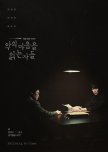This review may contain spoilers
Facing the dark side of humanity. Slow Food for Thought. Intense. Powerful.
"Through the Darkness" takes an experimental approach within the crime genre. It is the serial adaptation of the autobiography of the first South Korean specialist in criminal psychology case analysis, Kwon Il-yong - about his pioneering work in the profiling of serial killers. His extensive research work was inspired by the methods of his American role model Robert Ressler of the FBI's Behavior Analysis Team, who also contributed to the introduction of the term 'serial killer'. The original title is "Those who read in the hearts of evil". Accordingly, the story essentially revolves around the approach of the young investigator to a 'new' form of criminalistic work: tracking down serial killers and their motives, backgrounds and intentions differs from the police work that was common up until then (1990s), since the selection of their victims appears at first glance to be arbitrary, motives are not immediately apparent and their 'gain' in the act is mainly of a psychologically peculiar nature. In order to be able to understand these psychological processes, a database of known psychological offender profiles first had to be created on the basis of comprehensive behavioral analyses. There is a lot of hard work behind it. It took a good decade before a separate unit for operative case analysis based on the American model could be created in South Korea, too - despite a great deal of opposition.
"Through the Darkness" is about approaching the darkest, most abysmal world of feelings and thoughts of the most brutal serial killers. While the story is also experimental in terms of pioneering the profiling itself, as far as KDrama goes, I mean mostly the way the real cases are processed and presented. There is no superficial plot about the story of the protagonists (let alone a romance). Nevertheless, relationships among colleagues develop over time. It is not 'suspenseful' in the sense of a thriller, because the perpetrators are always known in advance, at least to the viewers. Together with the investigative team, however, we set out to learn to understand the behavior in order to get a 'grab' for the investigation and arrest. This is quite fascinating and captivating. Inevitably, the viewers also enter the psychic worlds, which seem to be devoid of any humanity, and learn to grasp the pattern of loose threads.
In the beginning, the perpetrators were also just people (and not monsters). Not any longer though? When did something decisive change and why? The existential questions and the confrontation with his own darkness, which the protagonist is forced to face during his field research, do not go unnoticed by the viewers either. Kim Nam-gil embodies the lonely path of the profiler in a minimalist, haunting, and compelling way. Thrilling! But not exciting in the classic sense. Powerful. Deep. Slow Food for Thought. Highly valuable. But to be enjoyed in moderation (risks and side effects for the minds of those who 'read the hearts of evil' cannot be ruled out...).
"Through the Darkness" is about approaching the darkest, most abysmal world of feelings and thoughts of the most brutal serial killers. While the story is also experimental in terms of pioneering the profiling itself, as far as KDrama goes, I mean mostly the way the real cases are processed and presented. There is no superficial plot about the story of the protagonists (let alone a romance). Nevertheless, relationships among colleagues develop over time. It is not 'suspenseful' in the sense of a thriller, because the perpetrators are always known in advance, at least to the viewers. Together with the investigative team, however, we set out to learn to understand the behavior in order to get a 'grab' for the investigation and arrest. This is quite fascinating and captivating. Inevitably, the viewers also enter the psychic worlds, which seem to be devoid of any humanity, and learn to grasp the pattern of loose threads.
In the beginning, the perpetrators were also just people (and not monsters). Not any longer though? When did something decisive change and why? The existential questions and the confrontation with his own darkness, which the protagonist is forced to face during his field research, do not go unnoticed by the viewers either. Kim Nam-gil embodies the lonely path of the profiler in a minimalist, haunting, and compelling way. Thrilling! But not exciting in the classic sense. Powerful. Deep. Slow Food for Thought. Highly valuable. But to be enjoyed in moderation (risks and side effects for the minds of those who 'read the hearts of evil' cannot be ruled out...).
Was this review helpful to you?


 9
9 39
39 15
15
















